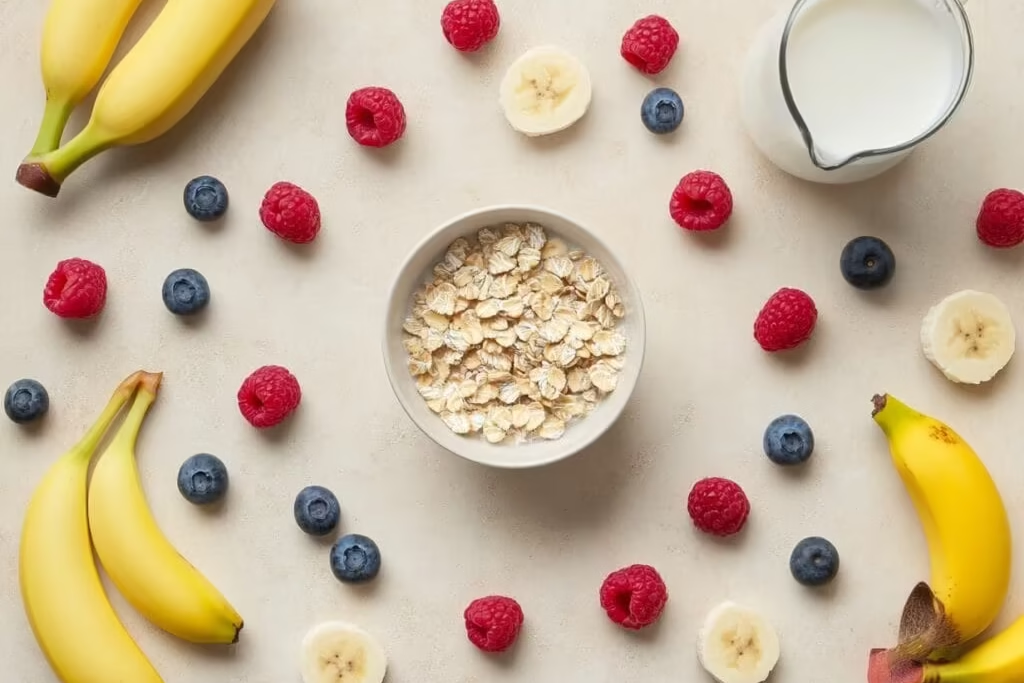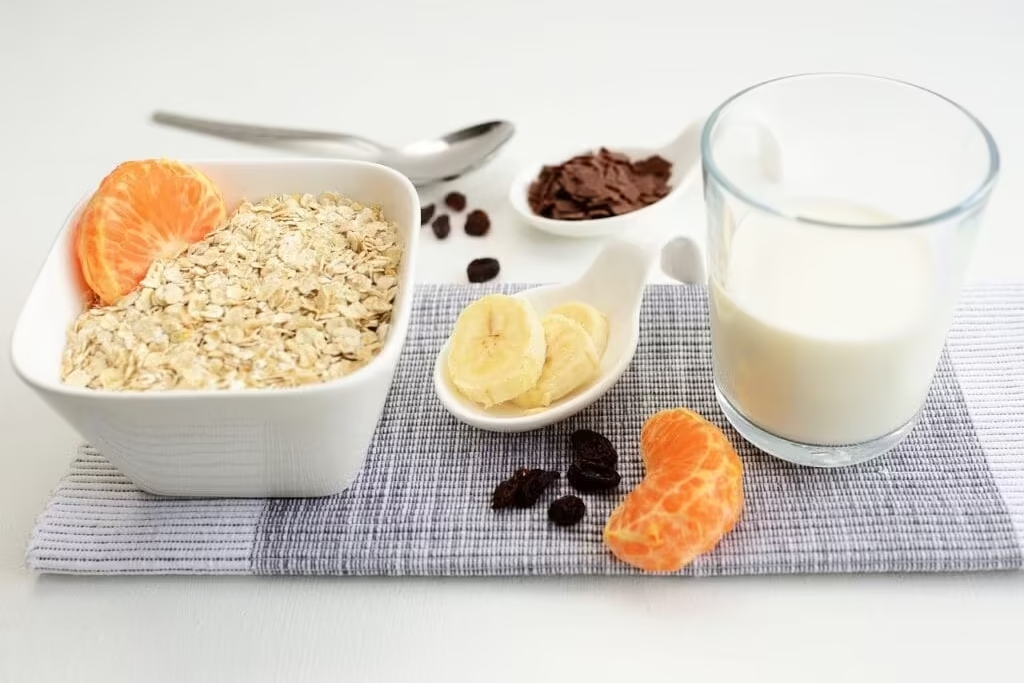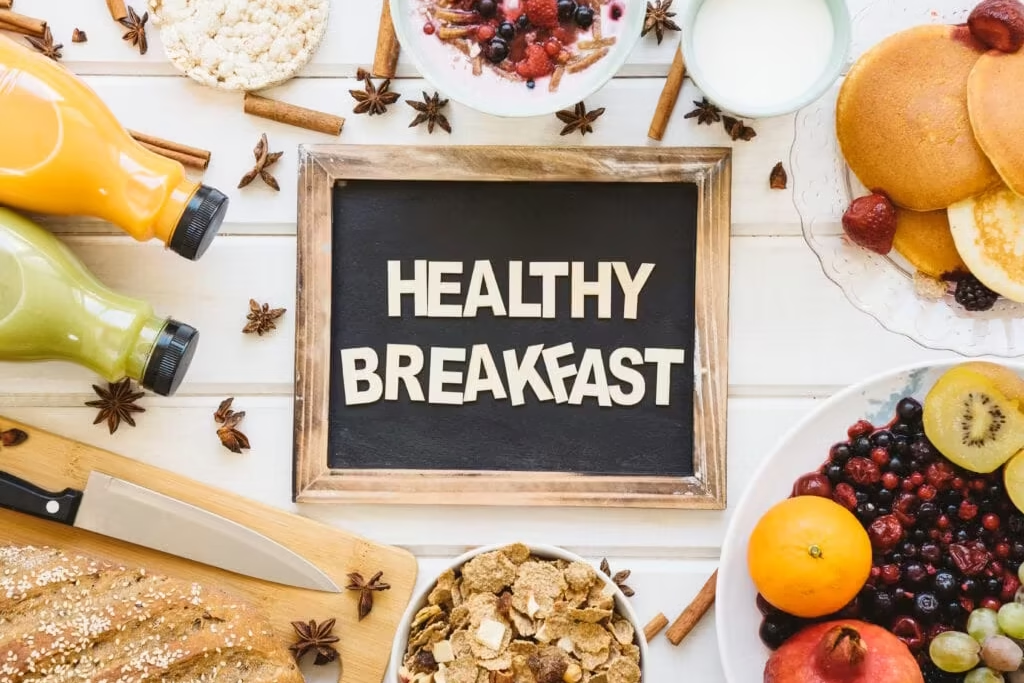Oatmeal has long been a favorite breakfast choice because it is easy to prepare, comes in various forms, and offers clear health benefits. Loaded with essential nutrients such as fiber, vitamins, and antioxidants, oatmeal rightly deserves its reputation as a “superfood.” But is it truly a perfect food to eat daily? Are there any downsides to including oatmeal in your diet every single day?
This article will dive into the benefits and potential drawbacks of eating oatmeal every day. We will explore its effects on heart health, weight control, and address concerns like gluten sensitivity or consuming too much sugar. Additionally, we’ll share creative ways to prepare oatmeal and tips to maximize its nutritional value.
Let’s see if eating oatmeal daily is the right choice for you!
Table of Contents
Is Eating Oatmeal Daily a Healthy Habit?
Oatmeal, made from oats, is a whole grain that ranks among the healthiest and most versatile breakfast options. It is available in several forms, each offering different textures, cooking times, and nutritional benefits. Knowing these differences can help you decide if eating oatmeal every day suits your dietary needs and lifestyle.
Types of Oatmeal You Can Eat Daily
Oatmeal is available in various forms that differ in how they are processed. These variations influence their texture, cooking time, and nutritional content.
Steel-Cut Oats
Steel-cut oats are the least processed type of oatmeal. The whole oat kernels are cut into small pieces with a steel blade, giving them a chewy texture and nutty flavor. They take the longest to cook, typically 20–30 minutes, but their minimal processing preserves nutrients and makes them rich in fiber.
Rolled Oats (Old-Fashioned Oats)
Rolled oats are steamed and flattened into flakes, which makes them quicker to cook compared to steel-cut oats. Their softer texture and mild flavor make them versatile for porridge, baking, or adding to smoothies and granola. Cooking rolled oats takes about 5–10 minutes.
Instant Oats
Instant oats are pre-cooked, dried, and cut into smaller pieces for faster preparation. They can be ready in just a few minutes by adding hot water or milk. However, many instant oatmeal products contain added sugars, salt, or artificial flavors, which can reduce their nutritional value.
Oat Groats
Oat groats are the most natural and least processed form of oats, with only the outer husk removed. They have a hearty texture and are often used in savory dishes such as grain bowls or pilafs. Cooking oat groats can take up to 45 minutes, but their minimal processing ensures high nutrient retention.
Quick Oats
Quick oats are similar to rolled oats but are processed further to reduce cooking time. They can be cooked in 1–3 minutes, making them a convenient choice for busy mornings. However, they may contain slightly less fiber compared to less processed varieties.
The Popularity of Oatmeal Across Cultures
Oatmeal is loved worldwide and prepared in many different ways. In the United States, it is often enjoyed as a sweet porridge topped with fruits, nuts, or honey. In Scotland, oats are a staple food, traditionally used in savory oatcakes or prepared into porridge with water and salt. Globally, oats are gaining popularity in baked goods, energy bars, and as a base for plant-based milk alternatives.

How Oatmeal is Made
The journey of oats from farm to table involves several steps, ensuring that the final product retains its nutritional value while meeting diverse consumer needs:
- Harvesting
Oats thrive in temperate climates and are harvested when fully ripe. Farmers carefully collect the mature grains to ensure maximum quality and yield. - Hulling
After harvesting, the inedible outer husk is removed, leaving behind the oat groat, the most nutritious part of the grain. This step is crucial to make oats safe and ready for further processing. - Processing
Depending on the type of oatmeal being produced, the oat groats are subjected to various processes:- Steaming to soften the grains and extend shelf life.
- Rolling to flatten oats into flakes, which reduces cooking time.
- Cutting to produce steel-cut oats with a hearty texture.
- Packaging
Once processed, the oats are packed and distributed for consumer use. Manufacturers often ensure that the packaging preserves freshness and nutritional quality.
Oatmeal’s adaptability and availability make it a staple grain in kitchens worldwide, accommodating a wide range of dietary needs and preferences.
Why Oatmeal Is Popular and Healthy for Daily Consumption
Oatmeal is celebrated not just for its versatility but also for its impressive nutritional profile. It is a go-to breakfast option that offers multiple health benefits:
- Rich in Fiber
Oatmeal contains a high amount of beta-glucan, a soluble fiber that:- Lowers bad cholesterol (LDL).
- Helps regulate blood sugar levels by slowing digestion.
- Promotes a feeling of fullness, aiding in weight management.
- Packed with Essential Vitamins and Minerals
- B Vitamins (B1, B5): Support energy production and maintain healthy skin.
- Iron: Facilitates oxygen transport in the blood, preventing fatigue.
- Magnesium: Strengthens bones, supports nerve function, and helps maintain steady heart rhythms.
- Heart Health Benefits
Regular consumption of oatmeal can reduce the risk of cardiovascular disease by improving cholesterol levels and supporting arterial health. - Energy Boosting
As a complex carbohydrate, oatmeal provides a steady release of energy, making it an excellent choice for a sustaining breakfast or pre-workout meal.
With its remarkable nutritional advantages and ability to complement a variety of diets, oatmeal has earned its place as a daily staple for millions of people.heart health and lasting energy.
For more on the specific benefits of oats, you can check out The Health Benefits of Oats and Oatmeal, which highlights how oats support overall well-being.
Macronutrient Composition
Oatmeal is a nutrient-rich food that offers a well-balanced combination of carbohydrates, protein, and healthy fats. These macronutrients make it an excellent choice for everyday consumption.
Carbohydrates
Oatmeal is packed with complex carbohydrates, providing a steady release of energy throughout the day.
- Amount: A 1-cup serving of cooked oatmeal contains about 27 grams of carbohydrates.
- Fiber: This serving includes 4 grams of dietary fiber, primarily beta-glucan, a soluble fiber that:
- Lowers cholesterol.
- Improves heart health.
- Promotes satiety and fullness.
Protein
Unlike most grains, oatmeal is relatively high in protein, offering about 5 grams per cooked cup.
- Benefit: Protein supports muscle repair, growth, and overall bodily functions.
- Enhancement: Pairing oatmeal with nuts, seeds, or milk further boosts its protein content, making it a more complete meal.
Fats
Oatmeal is naturally low in fat, containing less than 2 grams per serving.
- Type of Fats: These fats are mainly unsaturated, which are beneficial for heart health.
Key Micronutrients in Oatmeal
Oatmeal is loaded with essential vitamins and minerals, reinforcing its “superfood” status:
Vitamins
- B Vitamins (B1, B5): Aid energy production and support healthy skin.
- Folate: Encourages cell repair and growth, particularly vital for pregnant women.
Minerals
- Iron: Supports oxygen transport in the blood (2 mg per serving).
- Magnesium: Contributes to muscle function, nerve health, and bone strength.
- Zinc: Plays a role in immunity and wound healing.
- Phosphorus: Important for strong bones and teeth.
- Manganese: Provides over 60% of the daily recommended intake, crucial for metabolism and bone health.
Antioxidants
Oatmeal contains unique compounds like avenanthramides, which:
- Reduce inflammation.
- Enhance blood flow.
- Soothe skin irritation (anti-itch properties).
Calorie Content
Oatmeal is relatively low in calories, making it suitable for weight management.
- Calories per Serving: A 1-cup serving of cooked oatmeal contains around 150 calories.
- Consideration: Toppings like sugar, honey, and dried fruits can significantly raise the calorie count, so moderation is essential.
Glycemic Index of Oatmeal
The glycemic index (GI) measures how quickly a food raises blood sugar levels. Oatmeal’s GI varies depending on its type:
- Steel-Cut Oats: Low GI (~55), meaning they have minimal impact on blood sugar.
- Rolled Oats: Moderate GI (~58–65).
- Instant Oats: Higher GI (up to 83) due to more processing.
For managing blood sugar, less processed options like steel-cut or rolled oats are ideal.
Why Oatmeal is a True Superfood
With its impressive nutrient profile and ability to provide sustained energy, oatmeal supports heart health, weight management, and digestion. Its versatility makes it an accessible and effective food for a healthy lifestyle. keep in mind when incorporating oatmeal into your daily routine.

Balancing Oatmeal with Other Foods in Your Diet
While oatmeal is a nutrient-rich food, relying on it too heavily may lead to imbalances in your diet.
- Limited Variety
Eating oatmeal daily can crowd out other nutrient-dense foods, reducing dietary diversity. For example, focusing solely on oatmeal might mean missing out on the antioxidants from berries or the healthy fats in nuts.Solution: Complement oatmeal with other foods like fruits, nuts, seeds, or dairy to ensure a balanced nutrient intake. - Insufficient Protein
Compared to other breakfast options like eggs or Greek yogurt, oatmeal is relatively low in protein. Without protein-rich sides or toppings, your meal may not provide sufficient amino acids for muscle repair and overall health.Solution: Add protein-rich ingredients such as nuts, seeds, milk, or yogurt to your oatmeal.
Potential Overconsumption of Sugar
Oatmeal’s versatility often invites toppings or additions that can diminish its nutritional value:
- Added Sugars
Pre-flavored instant oatmeal packets often contain high levels of sugar, which can lead to excessive calorie intake and potential weight gain.Solution: Choose unsweetened oatmeal and flavor it with fresh fruit, cinnamon, or a small amount of honey. - High-Calorie Toppings
While toppings like nuts, dried fruit, or maple syrup are healthy in moderation, excessive amounts can significantly increase the calorie content of your meal.Solution: Use toppings sparingly and focus on fresh, nutrient-dense options.
Is Oatmeal Safe for Gluten-Sensitive Individuals?
Although oats are naturally gluten-free, cross-contamination during processing is a common issue.
- Celiac Disease
People with celiac disease must choose certified gluten-free oatmeal to avoid adverse reactions. - Avenin Sensitivity
A small number of people are sensitive to avenin, a protein in oats that can mimic gluten intolerance.Solution: Check labels for “certified gluten-free” products if you are sensitive to gluten or avenin.
Digestive Discomfort
Oatmeal’s high fiber content can cause digestive issues for some people, especially if they’re new to a high-fiber diet.
- Bloating or Gas
Consuming too much fiber too quickly can overwhelm the digestive system.Solution: Start with smaller portions and gradually increase your intake to allow your body to adjust. - Overeating Oatmeal
Large servings can exacerbate discomfort.Solution: Stick to recommended portion sizes and balance oatmeal with other foods.
Risk of Micronutrient Imbalances
Oats contain phytic acid, a compound that can reduce the absorption of minerals like iron, zinc, and calcium.
- Mineral Deficiency
Overeating oatmeal without pairing it with other foods can contribute to deficiencies over time.Solution: Combine oatmeal with vitamin C-rich foods, such as oranges or strawberries, to enhance mineral absorption.
Monotony in Diet
Eating the same food every day can lead to boredom, reducing your motivation to maintain a healthy eating routine.
- Loss of Enjoyment
A monotonous breakfast routine may leave you unsatisfied, increasing the temptation to indulge in unhealthy snacks later.Solution: Experiment with different oatmeal recipes, flavors, and toppings to keep your meals exciting and varied.
Creative Ways to Enjoy Oatmeal
Oatmeal’s adaptability makes it a great base for countless recipes. Here are some ideas to keep it fresh and enjoyable:
Use it as a thickening agent in soups or smoothies.
Classic Sweet Recipes
Top with fresh fruits like bananas, strawberries, or blueberries for natural sweetness.
Add crunch with nuts or seeds.
Enhance flavor with spices like cinnamon or nutmeg.
Savory Oatmeal
Pair with eggs, avocado, or sautéed vegetables for a hearty meal.
Add herbs, spices, or a drizzle of olive oil for extra flavor.
Oatmeal Smoothies
Blend oats with greens, fruits, and a liquid base like almond milk for a nutrient-dense drink.
Baked Oatmeal
Mix oats with nuts, seeds, and fruit, then bake for a convenient, meal-prepped breakfast option.
Overnight Oats
Soak oats in milk or a plant-based alternative overnight, adding toppings like chia seeds or cocoa powder.
Oatmeal Desserts
Use oats in cookies, granola bars, or as a crumble topping for baked fruits.
Other Culinary Uses
Include oatmeal in recipes as a binder for veggie burgers or meatloaf.
For additional tips on maintaining a balanced diet, visit 10 Healthy Dinner Habits for a Balanced Life, which provides practical advice on creating healthy eating routines.
Tips for Preparing a Perfect Oatmeal
- Adjust the Liquid Ratio: The consistency of oatmeal depends on the liquid-to-oat ratio. Using more liquid creates a creamier texture, while less liquid results in a denser dish.
- Cook with Milk or Broth: Replacing water with milk adds creaminess, while broth enhances savory preparations.
- Experiment with Toppings: Rotating toppings regularly keeps oatmeal exciting and prevents monotony.
- Batch Prep: Preparing oatmeal in bulk and refrigerating portions can save time on busy mornings while ensuring a healthy meal is readily available.
By exploring different methods of preparing oatmeal, you can enjoy its versatility and keep it a consistent part of your diet without feeling restricted. The key is to experiment with flavors and combinations that suit your preferences and nutritional needs.

FAQs About Is Eating Oatmeal Every Day Healthy?
Here are some common questions people have about incorporating oatmeal into their daily diet:
1. Does Eating Oatmeal Every Day Cause Weight Gain or Help Weight Loss?
Oatmeal itself is low in calories and can aid in weight management. However, adding high-calorie toppings like sugar, syrups, or large amounts of nut butters can increase its calorie density and lead to weight gain if consumed in excess. To keep oatmeal weight-friendly, use fresh fruits, spices, and a moderate amount of healthy fats like nuts or seeds.
2. Is oatmeal good for children?
Yes, oatmeal is an excellent choice for children as it provides essential nutrients like fiber, vitamins, and minerals that support growth and development. It is easy to digest and can be customized to suit their taste preferences. For young children, ensure the oatmeal is soft and free of added sugars.
3. What Is the Healthiest Type of Oatmeal to Eat Every Day?
The best type of oatmeal depends on your nutritional goals and preferences.
- Steel-Cut Oats: Best for those seeking maximum fiber and nutrient density.
- Rolled Oats: A versatile and quicker-cooking option that retains most nutrients.
- Instant Oats: convenient, but often lower in fiber and may contain added sugars. Opt for plain, unsweetened varieties.
4. Can oatmeal improve skin health?
Yes, oatmeal can benefit skin health both when consumed and applied topically. The antioxidants and anti-inflammatory compounds in oats, such as avenanthramides, help soothe skin irritation and reduce inflammation. Consuming oatmeal regularly may also support skin health by promoting gut health and reducing oxidative stress.
5.Is it okay to eat oatmeal every day for dinner?
Absolutely! Oatmeal is a versatile food that can be enjoyed at any time of the day. Savory oatmeal recipes, in particular, make a satisfying and nutritious dinner option. Pair it with proteins, vegetables, and healthy fats for a balanced evening meal.
6. Are there any additives to avoid in oatmeal?
Yes, when choosing pre-packaged oatmeal products, watch out for:
- Added sugars: common in flavored instant oatmeal. Look for unsweetened varieties.
- Artificial Flavors and Preservatives: These can diminish the nutritional value of oatmeal.
- Salt: Opt for low-sodium options to maintain heart health.
Making oatmeal from scratch allows you to control the ingredients and avoid unhealthy additives.
Conclusion: Is Eating Oatmeal Every Day Healthy?
Oatmeal is undeniably a nutrient-packed food that offers a multitude of health benefits, from improving heart health and supporting weight management to stabilizing blood sugar and promoting digestion. Its versatility allows it to fit into various dietary preferences and mealtimes, making it a practical and wholesome choice for daily consumption.
However, as with any food, balance and variety are key. While eating oatmeal every day can be healthy for most people, it’s important to pair it with other nutrient-dense foods to ensure a well-rounded diet. Paying attention to portion sizes, avoiding excessive sweeteners, and experimenting with savory or creative preparations can help maximize its benefits while keeping your meals enjoyable.
In conclusion, oatmeal can be a sustainable part of a healthy daily diet when consumed mindfully. Whether you’re looking to boost your energy, manage your weight, or support your overall well-being, this humble grain proves to be a powerful ally in achieving your health goals. For even more inspiration, explore related topics on Healthy Recipes Cook to find creative ways to enjoy oatmeal and other nutritious foods.

